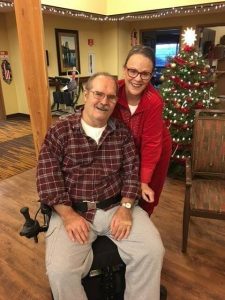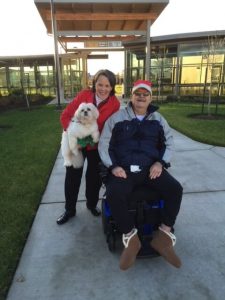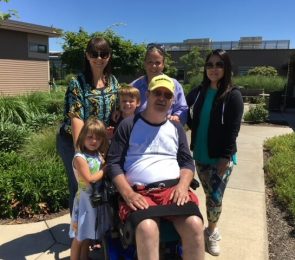Published: May 5, 2021

There are 5.5 million military and veteran caregivers in the U.S. today. These hidden heroes make incredible sacrifices in support of caring for a loved one—whether a parent, grandparent, child, or wounded warrior; they also face unique experiences and struggles based on their circumstances. Even those caring for a wounded warrior may be in very different situations. Some may have recently joined the ranks of caregiver, while others may have been navigating this difficult path for many years.
Carol finds herself in the latter wounded warrior caregiver group. She met her husband after he returned from Vietnam, and they got married in 1970. Her husband had lost an eye in the war, but it would take many years to realize the full extent of his unseen injuries. After 10 years of her husband struggling to retain employment and noticing more behavior she didn’t fully understand, Carol brought her husband to the VA hospital to be evaluated. At the time, knowledge surrounding a traumatic brain injury (TBI) was still very limited, but Carol and the doctors determined her husband was suffering from seizures. Over time, as medical advancements in neurology were made, Carol’s husband was officially diagnosed with a TBI and spinal cord injury.
Carol did her best to care for her husband and her children, but he required more and more assistance as the years went on. “At first, things went along okay with many trips to [the] VA,” Carol shared. “Over time, I brought more help in as he needed it, but he was becoming more and more isolated. It became an ongoing struggle to get him to do anything.” Eventually, the VA started discussing the option of rehab placement with Carol, and longer term plans. When a brand new facility opened nearby, she made the difficult decision to move him into full-time care.
“It took about three months for him to understand he was staying there permanently,” Carol recalled. “With help from the girls [our daughters] and I, he adjusted well. He has been there for six years now. I moved to the small town where the facility is located to be close to him. The one BIG addition for me was having a caseworker now who handles most of his appointments at VA and private care. This is the first time in over 40 years that I’ve really had some help. It took me six months to adjust to not going with him, but I needed to hand it over. I still work closely with the case manager to be updated on his care and appointments.”
“With help from the girls [our daughters] and I, he adjusted well. He has been there for six years now. I moved to the small town where the facility is located to be close to him. The one BIG addition for me was having a caseworker now who handles most of his appointments at VA and private care. This is the first time in over 40 years that I’ve really had some help. It took me six months to adjust to not going with him, but I needed to hand it over. I still work closely with the case manager to be updated on his care and appointments.”
Carol has spent her entire life balancing her husband’s care, raising her children, and working. She’s navigated the complex and heart-wrenching adjustment of becoming a caregiver for a spouse, and the sacrifices that come with that. Now, she faces another major shift in her life. Carol’s children are grown and out of the home, her husband lives in a facility, and she’s found herself on her own. While that gives her the time to finally focus on her own mental well-being and care, it’s also very lonely. “As a caregiver, for the first time, I have been able to move on for myself,” Carol said. “I now find myself with an interesting problem that few can relate to. I am married, but I am [living] single. I have many girlfriends, and we go to lunch and travel a bit, but at the end of the day, they go home to do things with their husband, and I am many times left out. They do not mean to do it, but they just really do not understand.”
While isolating, Carol is far from alone. In fact, according to the 2020 Resilience Under Stress Study (RUSS; conducted during the height of the COVID-19 pandemic), caregivers had fewer social resources than their non-caregiver peers: fewer friends, fewer people to ask for a favor, and less social support. In an effort to find and connect with a group of people who do understand what she’s going through, Carol joined Blue Star Families’ Caregiver Cohort.
Each year, with the help of Veterans United, Blue Star Families brings together military-connected caregivers to take part in self-care workshops and activities in their local communities. This gives them a dedicated time to focus on themselves and an opportunity to connect with other caregivers. What originated as an in-person program, the events create a network, offer valuable training to best support their mental well-being, and provide a much-needed outlet. While the pandemic created challenges in how the program would be offered this year, it also made delivering support for caregivers more important than ever. Vicky Perkins, Senior Manager of National Chapter and Programs at Blue Star Families, designed a cohort model that focuses on year-round virtual workshops and a corresponding caregivers box.

To lead the virtual workshops, Vicky recruited Tammy Meyer, a military spouse and professional life coach. Together, Vicky and Tammy have strategically developed self-care events based on survey data and feedback to directly impact the lives of caregivers. Carol and 49 other caregivers will take part in these workshops while learning to diffuse stress and anxiety, identifying personal values and goals, and determining an ideal picture for their lives and a plan to achieve it. Ultimately, they’ll walk away with the training and tools needed to focus on their well-being to better support themselves and their family.
We all need (and deserve) a community that empowers us to thrive. That’s why, here at Blue Star Families, our mission is to be the connector, allowing you and your family to find that network of support—whether through caregiver toolkits full of information and resources, organized Coffee Connect events to share and learn from one another, or virtual Caregiver Cohort workshops led by an expert on self-care and wellness.
If you too are a military connected caregiver and want to learn more about the resources available to help you, please join us at our upcoming town hall event, Military Caregivers: Celebrating America’s Hidden Heroes, on May 18th. Reserve your spot today!
Posted In:
